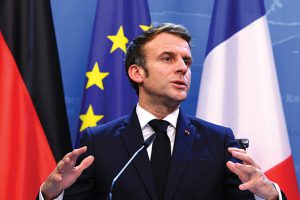Bloomberg
France’s economy grew more than anticipated at the end of last year, overcoming supply shortages and Covid-related disruptions to give President Emmanuel Macron a lift ahead of April’s election.
Rising consumer spending and investment in the euro area’s second-largest economy powered a 0.7% increase in gross domestic product in the fourth quarter. That was above the 0.5% expansion expected by economists and brought growth for the whole of 2021 to 7%.
The resilience of France’s recovery — a contrast with Germany, which may be heading toward its second recession of the pandemic — is a key asset for Macron as he seeks to rekindle the support of voters who backed him and his reform agenda five years ago.
Recording an expansion at the end of 2021 bodes well for this year, amid signs that supply bottlenecks are fading. Renault SA’s chairman Jean-Dominique Senard told Bloomberg Television that the carmaker expects a semiconductor shortage that has roiled the auto industry to ease in the second half of 2022.
With less than three months until the election, the 44-year-old French president is facing difficulties on other fronts including protests against his vaccination strategy and school strikes over his management of a recent swell in coronavirus cases. Emmanuel Macron’s main contenders are seeking to steer the debate to security and immigration.
The economy is a more straightforward battleground for Macron. France’s recent performance compares favourably to those of its European peers with activity returning sooner to pre-crisis levels and holding up as the government refrained from reinstating tough curbs.
“7% growth is spectacular and behind it there are jobs, factories, businesses,†French Finance Minister Bruno Le Maire said on France 2 television. “We have made the right economic choices and everything that for decades seemed impossible is almost within reach if we continue in the same direction.â€
France’s labour market is also recovering robustly after a jump in unemployment triggered by stringent lockdowns in 2020. Data earlier this week showed the number of job-seekers has dropped to the lowest level in almost a decade, with a particularly sharp decline among young people.
Still, Macron and the French economy are facing near-term headwinds from a surge in energy prices and a broadening acceleration of inflation. So far, his government has mitigated the worst of the impact with price-caps and handouts for households. But at a cost of around 15.5 billion euros ($17.4 billion), the IMF warned earlier this week that those measures are onerous for public finances, poorly targeted and must be temporary.
Consumer and business confidence have held up, for now. While the GDP data showed household spending growth slowing in the fourth quarter, that followed a surge in the third. French business investment, which has been particularly strong through the pandemic, accelerated.
In all, France’s economic output was 0.9% above its pre-crisis level at the end of last year.
 The Gulf Time Newspaper One of the finest business newspapers in the UAE brought to you by our professional writers and editors.
The Gulf Time Newspaper One of the finest business newspapers in the UAE brought to you by our professional writers and editors.
